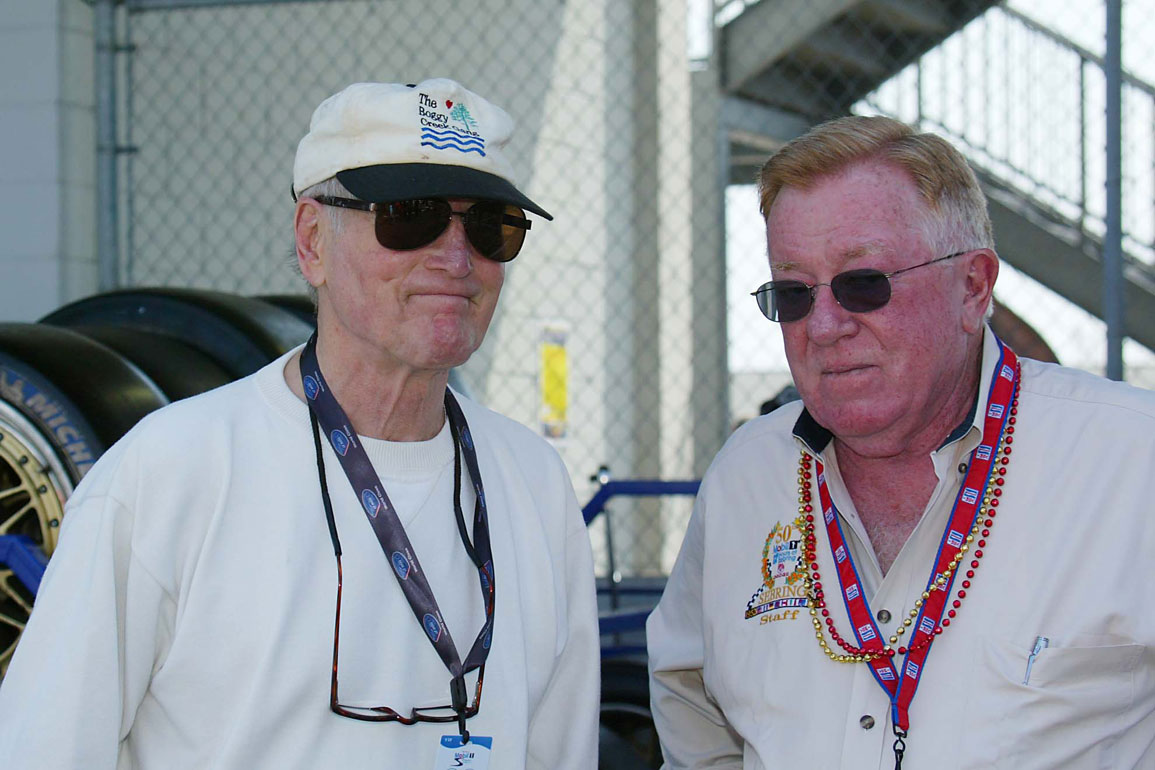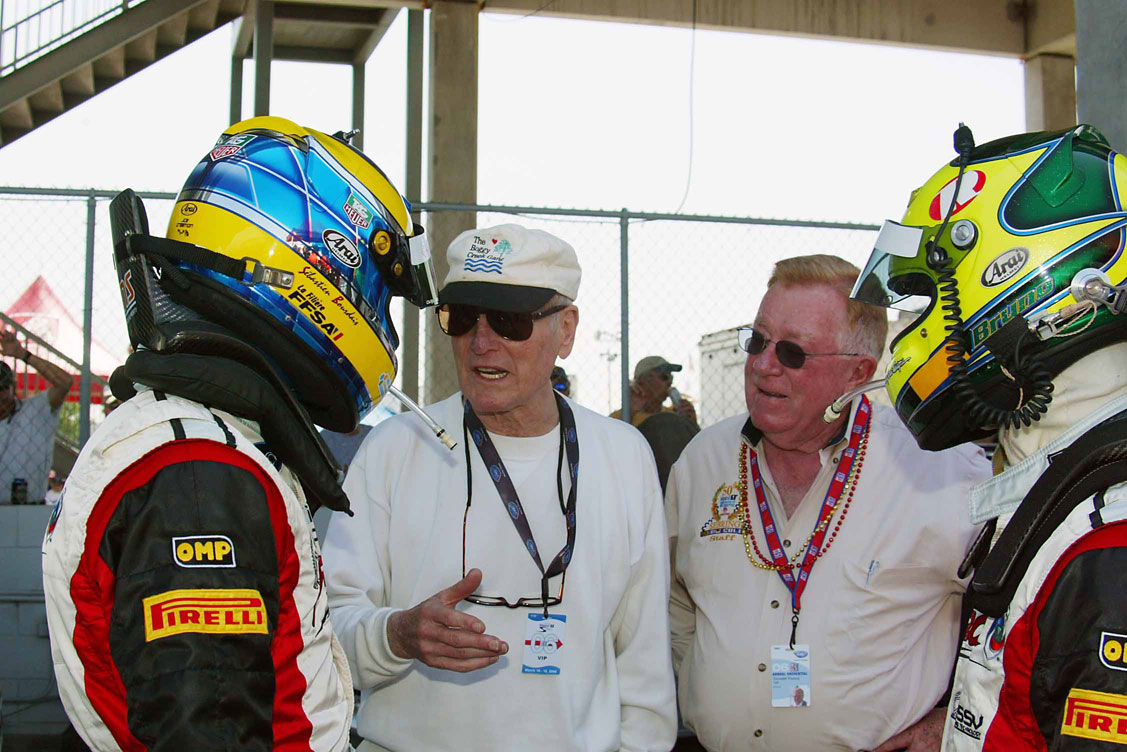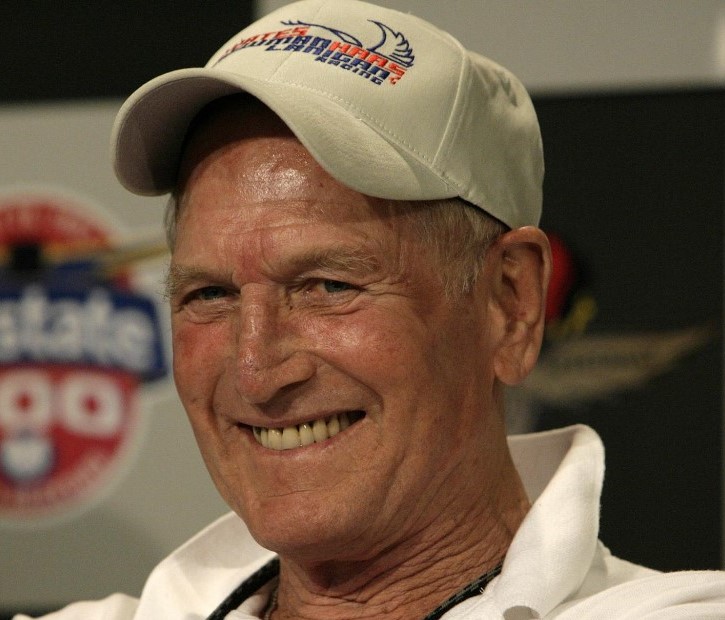Paul Leonard Newman Tribute
 |
| Paul L. Newman 1925 – 2008 Racing mourns a great friend |
Paul Leonard Newman (PLN), eighty-three, one of the most warmly admired and universally loved figures in motion pictures, motorsports and philanthropy, died Friday after a long battle with cancer at his farmhouse home near Westport, Connecticut. His death was as private and discreet as the way he had lived his life, a humble artist who never thought of himself as "big," surrounded by his beloved family and the close circle of friends that had supported him through his last days. He is survived by his wife of fifty years, the actress/director Joanne Woodward, five children, two grandsons, and his older brother Arthur of Rancho Mirage, California.
Paul, known to family and friends as PL, was born in Cleveland, Ohio, on January 26, 1925. His father, Arthur Sr., and mother, Theresa, raised Paul and his brother in Shaker Heights. Arthur Sr. was a successful sporting goods store owner, a man highly regarded for his business ethics and to whom Paul credited his own morality, untiring tenacity at work and sports, and standards for judging himself and others. At a young age, PL showed a keen interest in theater and with encouragement from his mother, he joined a local children's drama group. He continued performing as a teenager at Shaker Heights High School, but on his eighteenth birthday, he enlisted in the Navy and later served as radioman/gunner on a torpedo plane in the Pacific during World War II. He had been rejected as a candidate for pilot training when a flight physical revealed that he was color blind.
 |
| Paul Newman and ALMS boss Don Panoz |
Discharged in 1946, PL attended Kenyon College in Gambier, Ohio, on a football scholarship. While pursuing an Economics major and acting in play after play, Paul managed to earn money by opening a student laundromat where he tempted customers by offering free beer for every load of dirty wash they brought in. He graduated in 1949 and spent a season doing summer stock in Williams Bay, Wisconsin, where he met and married his first wife, actress Jackie Witte, with whom he had three children: Susan, Stephanie and son Scott, who later died in his twenties.
Following the death of his father in 1950, Paul returned home to help manage the family sporting goods store. After eighteen months, he turned the business over to his brother, moved east to study at the Yale Drama School, and later landed roles in numerous live television shows in New York, including an adaptation of Ernest Hemingway's "The Battler" written by A.E. Hotchner.
 |
| Paul Newman with Sebastien Bourdais, Bruno Junqueira and ALMS boss Don Panoz |
In 1952, Paul succeeded in joining the prestigious Actors Studio and was later elected its president in the 1980's. He made his Broadway debut in the original New York production of William Inge's "Picnic," in which he met and fell in love with his future wife, Joanne Woodward, whom he married in 1958. Other starring roles on Broadway were in Tennessee William's "Sweet Bird of Youth," "The Desperate Hours" and "Baby Want a Kiss" by James Costigan.
Paul made his first appearance on the big screen in "The Silver Chalice," which he described as his "cocktail dress" picture because of the toga he had to wear. And for years later, whenever it was scheduled to play on TV, he would take out an ad in Variety to apologize for his performance. It was Paul’s portrayal of boxer Rocky Graziano in 1956's "Somebody Up There Likes Me" that catapulted him to stardom.
Over the next decades, Paul starred in more than fifty films including: "The Rack," "The Long Hot Summer" (with wife Joanne) for which he was named Best Actor at the Cannes film festival, "The Left Handed Gun," "Exodus," "Sweet Bird of Youth," and "The Hustler" (which brought him the second of eight Academy nominations for Best Actor and which introduced him to the role of "Fast Eddie Felson" to which he would return twenty-five years later when he would win his Academy Award for Martin Scorsese’s "The Color of Money"). There were also "Paris Blues" (with Joanne), "What a Way to Go," "Harper," Hitchcock's "Torn Curtain," and in 1969, teaming with Robert Redford in George Roy Hill's smash hit western "Butch Cassidy and the Sundance Kid," which became an instant classic. Four years later, Newman, Redford and Hill were gleefully reunited for the Academy Award-winning Best Picture, "The Sting." Paul had received his first nomination in 1959 for his work opposite Elizabeth Taylor in "Cat on a Hot Tin Roof" and was nominated for his performances in "Hud," "Cool Hand Luke," "Absence of Malice," "The Verdict," "Nobody's Fool," and "Road to Perdition." His long list of film credits goes on to include "The Life and Times of Judge Roy Bean," "Buffalo Bill and the Indians," "Mr. and Mrs. Bridge" (with Joanne), "Slap Shot," "The Hudsucker Proxy," "Message in a Bottle," and most recently, the animated blockbuster "Cars."
Paul has also been recognized for his work behind the camera, earning an Academy Award nomination for Best Picture and a Golden Globe award for Best Director for "Rachel, Rachel," which he produced and directed, and which starred Joanne Woodward. It was written by their friend Stewart Stern from the novel "A Jest of God" by Margaret Laurence. Paul took on its direction as a challenge to reflect in his own creative life the leading character’s willingness to "take a tiny first step" toward courage. Additionally, Newman directed, produced and starred in "Harry and Son," produced and directed "The Effect of Gamma Rays on Man-in-the-Moon Marigolds" (starring Joanne), and he directed "The Glass Menagerie" (also starring Joanne) and the tele-film "The Shadow Box" by friend Michael Cristofer, the latter earning Paul an Emmy nomination.
In 2003, Paul received a Tony nomination for his inventive and precedent-changing performance as the Stage Manager in the Broadway production of Thornton Wilder's "Our Town," which also aired as a TV production for which he received an Emmy nomination. He had previously performed the play at the Westport Country Playhouse in Connecticut, which he, Joanne and the Westport community had restored and reopened as one of the great, new off-Broadway theaters in the country. In 1955, he had co-starred in a TV musical of "Our Town" with Frank Sinatra and Eva Marie Saint.
In 2005, he was given an Emmy award, a Golden Globe, and a Screen Actors Guild award for his performance in the mini series "Empire Falls," for which he also served as executive producer, and co-starred Ms. Woodward. Paul was awarded an Honorary Oscar in 1986 in recognition of his outstanding contributions to film, and the Cecil B. DeMille award from the Hollywood Foreign Press Association in 1984. In 1992, Paul and Joanne received Kennedy Center Honors in Washington.
In 1969, Paul portrayed a professional race car driver in "Winning" opposite Joanne and Robert Wagner, and quickly developed a passion for racing. It dared his grit and gave him his most demanding opportunity to challenge what he had begun to call "Newman's Luck." In 1975, he came in second at the twenty-four hours of Le Mans, considered by many to be the most auspicious auto race in the world. He won four "Sports Car Club of America National Championships," and at age seventy, he was listed in the Guinness Book of World Records as being the oldest driver to win a professionally sanctioned race – 1995’s twenty-four hours of Daytona. He raced his Corvette regularly in the GT1 Series. 2007 was his last season of active driving, when he and his #82 car won two races at Lime Rock Park.
But despite all challenges, victories and awards, Paul derived his deepest satisfaction privately, from his quiet work in philanthropy. He used his influence to advance many social causes. He accomplished this with an uncanny ability to break new ground. In 1982, he founded Newman's Own, which was one of the first food companies to use all natural products, and later pioneered with his daughter Nell an organic line. Today, Newman’s Own is a multi-million dollar a year food business whose proceeds are donated to thousands of charities around the world through Newman’s Own Foundation, a total which now exceeds $250 million.
Particularly close to his heart are the "Hole-in-the-Wall Camps" for children with life-threatening health conditions. One day, over twenty years ago, while sitting in a rowboat on a little woodland lake, then full of snapping turtles, and surrounded by the Connecticut woods, he envisioned an old Western town like the one in "Butch Cassidy" stretched along the shore. But its facades would hide not only "roughing it" accommodations for children who would come for two weeks, strictly for summer fun, but all the modern equipment that health emergencies might require, and a top cadre of medical personnel in western costume. Today there is an Association of such camps – eleven member camps around the world, all on different themes, in Connecticut, New York, Florida, California, North Carolina, Ireland, United Kingdom, Hungary, France, Italy and Israel – with additional programs in Africa and Vietnam. Over 135,000 children have attended a Hole-in-the-Wall Camp free of charge since the first one opened. In 2009, it is anticipated that 17,000 more sick children will enjoy a camp experience that heals not only their spirits, but the spirits of the hundreds of young volunteers who find inspiration in helping the children to a happy time and sometimes, even recovery or remission.
When asked why he started the Hole-in-the-Wall Camps, Paul spoke of luck again: "I wanted to acknowledge luck: the chance and benevolence of it in my life, and the brutality of it in the lives of others, who might not be allowed the good fortune of a lifetime to correct it."
A tireless champion of the need for more corporate social responsibility and philanthropy, Paul established the “Committee Encouraging Corporate Philanthropy," a forum of top business executives of major corporations whose purpose it is to promote the role of business in supporting the charitable sector. Today, over 170 companies and their executives are members. Most recently, Paul joined with business leaders – including John Whitehead, Josh Weston and Jack Hennessy – to form the Safe Water Network, which funds the development of innovative approaches to bring safe water to the world’s poor.
In addition to these organizations, Paul was active in various other charities and each year made contributions to thousands of groups around the world.
In 1994, the Academy of Motion Picture Arts and Sciences presented Newman with the coveted Jean Hersholt Humanitarian Award – the equivalent of an Academy Award for philanthropic work. Soon after he received this honor, Paul made the decision to never accept future awards for his charitable work. He was personally reluctant to acknowledge that his charity was anything special; he treated it lightly – as the product of love, not virtue – and true to his character, he burned his Awards Show tuxedo in a roaring front yard ceremonial bonfire.
A week ago Paul sat with his daughter in the arbor of the garden, breathed in all the late summer beauty, and said very quietly, "It's been a privilege to be here."
Survivors include his wife, Joanne Woodward; his five children: Susan, Stephanie, Nell, Melissa (Lissy) and Clea; two grandchildren: Peter and Henry Elkind; sons-in-law: Raphe, Kurt and Gary; and his brother, Arthur Newman.
On hearing of Paul's death, a friend said, "Now cracks a noble heart," but knew that Paul would have laughed at that. The same friend wrote: "No one in his audience was ever privy to the tenderness and pride Paul had for Joanne and her talent. Watching him on the set watching her, from his seat by the camera, was to see a man transformed: his brave face taken all unawares, his lips parted in amazement, his eyes brimming with tears that never fell. It was a brief window into a man in perpetual love."
Donations can be made to the Association of Hole in the Wall Camps www.HoleInTheWallCamps.org.
